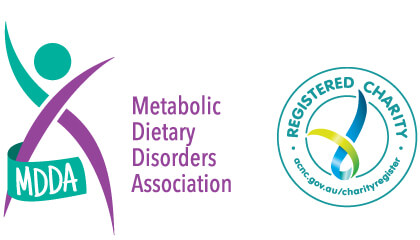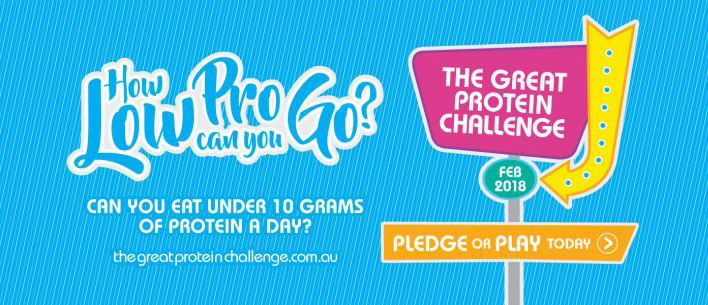The Great Protein Challenge to put Aussies in the shoes of those living with a debilitating rare disease
From 1 February 2018, Australians will be asked to give up protein for 24 hours to help raise much needed awareness and funds to support those living with a debilitating, rare genetic metabolic disorder – called Phenylketonuria or PKU. This includes abstaining from protein-rich foods such as red meat, fish, eggs, dairy, lentils, nuts, pasta, soy, chocolate and many vegetables.[i]
An initiative of Metabolic Dietary Disorders Association (MDDA), ‘The Great Protein Challenge: How Low Pro Can You Go?’ aims to encourage everyday Australians to experience a typical day in the life of a person living with PKU by significantly reducing their protein intake for 24 hours.
“Although people with PKU in other parts of the world have access to the only prescription medicine available to treat the condition, Australians with PKU are still not able to get subsidised access to this treatment. This means the only currently available treatment option is to adhere to a strict, lifelong, low-protein diet – despite research finding that managing PKU with diet alone does not lead to optimal patient outcomes,” said Monique Cooper, President of MDDA.
“Imagine being a hungry teenager and your daily limit of protein is equivalent to only two slices of bread. For people with PKU, this means a diet restricted to consuming between 1-8 grams of protein a day. This compares to 46-64 grams of protein a day for people without PKU. This can be extremely restrictive, limiting and costly for Australian PKU families,” said Ms Cooper.
PKU occurs when liver cells are unable to break down an amino acid called phenylalanine (Phe), which is found in most foods.[ii] It is estimated that 1,6001 Australians currently live with PKU, which is diagnosed in 1 in every 15,000 newborn babies.2
Elevated protein levels in the bloodstream can become dangerously toxic for people with PKU, affecting brain development in babies and infants; and concentration, mood and energy levels in adolescents and adults. Over time, high levels of protein in the blood may lead to brain damage and other serious health complications if left untreated, including depression and anxiety.[iii],[iv]
“Protein-rich foods are usually consumed for growth, function and repair of the body. However, as people with PKU are either missing or don’t produce enough of a particular enzyme, they are unable to break down foods containing protein in the usual way,” said Ms Cooper.
“In addition to the restrictive low-protein diet, people with PKU must also take Phe-free amino acid supplements, which are not easy or palatable to consume, in order to prevent malnutrition,” she said.
The Great Protein Challenge will kick-off on 1 February and will conclude on Rare Disease Day on 28 February. It is expected this initiative will become an annual awareness and fundraising event.
“We are encouraging all Australians – whether you want to participate as an individual, a team, or as part of a company – to show us How Low Pro Can You Go? to support those in the community living with this debilitating rare condition,” said Ms Cooper.
As part of The Great Protein Challenge, MDDA will be asking Australians to:
- Visit thegreatproteinchallenge.com.au for more information and to register and donate.
- Choose to ‘PLEDGE or PLAY’ to support our cause and help raise awareness.
- PLEDGE: donate funds directly to support our cause OR to sponsor and support a friend taking the challenge and PLAYING their protein.
- PLAY: Abstain from eating protein-rich foods (such as meat, eggs, chocolate or dairy) for 24 hours, and ask your friends to PLEDGE their support for you.
- Host a PLAYDATE of your own (as a corporation or group) and play together as a team.
- Share your experiences and join the online conversation by using #lowpro4PKU
- Encourage friends, family or colleagues to get involved.
Some of the foods people living with PKU are limited to eat on a daily basis include egg replacers, low-protein cheese, low-protein pasta, low-protein bread and low-protein cereal.1
“Unlike fad diets, people with PKU have no choice about what foods they are able to consume unless they want to risk increasing their Phe levels, which may lead to serious brain damage and other health issues. As a parent of a child with PKU, I know first-hand the challenges and risks of trying to manage protein intake to ensure Phe levels remain in control and don’t lead to further heath complications,” said Ms Cooper.
“I urge anyone, young or old – whether you are a politician, a high-profile personality, or a member of the community – to show Australia how low pro you can go this February to support those living with PKU”, Ms Cooper said.
For media enquiries, please contact Ogilvy PR Health:
Alex McInnes Tania Jayesuria
P: 02 8281 3865 P: 02 8281 3875
M: 0404 767 998 M: 0404 094 744
E: [email protected] E: [email protected]
About The Great Protein Challenge
2018 marks the inaugural launch of The Great Protein Challenge, an important health initiative to raise awareness and support for the debilitating, rare genetic metabolic disorder called Phenylketonuria or PKU. The Challenge will run for the month of February, commencing on Thursday 1 February and ending on Rare Disease Day, which takes place on 28 February. All funds raised through the Challenge will help to raise awareness and support for the Australian PKU community.
About Metabolic Dietary Disorders Association (MDDA)
MDDA is a national registered charity, founded in 1996 by parents to support other families and individuals affected by Inborn Errors of Metabolism (IEMs), which are rare genetic disorders.
References
[1] Boneh A, et al (2006). Three-year audit of the hyperphenylalaninaemia/phenylketonuria spectrum in Victoria. J Paediatr Child Health. 2006 Sep;42(9):496-8.
[2] Human Genetic Society of Australasia. The PKU Handbook, 2005. Available at: https://www.hgsa.org.au/documents/item/48 [Accessed 15 December 2017].
[3] Al Hafid N & Christodoulou J (2015). Phenylketonuria: A review of current and future treatments. Transl Pediatr. 2015 Oct;4(4):304-17.
[4] Enns GM, et al (2010). Suboptimal outcomes in patients with PKU treated early with diet alone: Revisiting the evidence. Mol Genet Metab. 2010 Oct-Nov;101(2-3):99-109.
[5] Anjema K, et al (2011). High plasma phenylalanine concentrations are associated with increased prevalence of mood swings. Mol Genet Metab. 2011 Nov;104(3):231-4.

